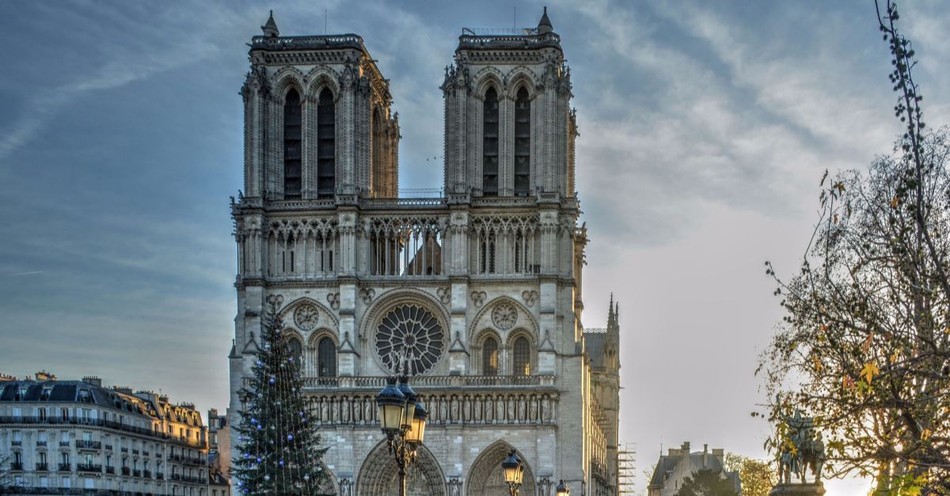I’ve learned a lot from Glenn Sunshine, the longest-serving faculty member of the Colson Fellows Program, and a professor of history at Central Connecticut State University. Glenn not only gets history, he also really gets worldview and, even better, how worldview and history are related.
On Monday night, as I was trying to make sense of the tragedy of the burning of the Notre Dame cathedral in Paris, I learned again from Dr. Sunshine. Part of my sadness was that I’ve never visited this wonder of the world, where Henry VI, King of England, was also crowned King of France in 1431, Napoleon crowned himself Emperor in 1804, and Joan of Arc was beatified in 1909. But there was more to my sadness, and the sadness of so many who, like me, were mourning the potential loss of a place they’ve never seen.
Glenn’s comments, posted on Facebook, are worth quoting:
I am a historian. I revere the past. Artefacts that allow us to touch the centuries touch a deep place in my heart. Having lived in Paris, I feel a personal connection to Notre Dame: Not only is it an 850-year-old artifact full of beauty but it is also the site of some very happy memories for me with students and especially with my family. My wife nursed our firstborn in Notre Dame. I have been in shock and mourning all day over the fire. And yet … I have also been thinking about C.S. Lewis’s words from “The Weight of Glory”: “You have never talked to a mere mortal. Nations, cultures, arts, civilizations – these are mortal, and their life is to ours as the life of a gnat.” My reason tells me he is right, but my emotions don’t agree. To take it a step further, if the thing that gives human life value is the Image of God, if we are really the crown of God’s creation, isn’t human life more important than the ancient artefacts that I revere? Why then do I get more upset at the loss of things whose longevity is “to ours as the life of a gnat” than I am at the dehumanization of people made in God’s image, at abuse and murder? As horrified as I am by those things, why do I feel the loss of ancient artefacts more? I don’t have a good answer, and I’m not looking for one, but pondering the significance of the fire at Notre Dame has gotten me thinking about these questions.
I think we do well to ponder these questions. I remember, after a fire ravaged the signature building of a college where I once worked, hearing the wise words of our President Bill Brown (now the Dean of the Colson Fellows Program): “We didn’t lose anything important.” He meant, of course, no human lives were lost. Bill went on to lead an incredible recovery and renovation project, and the college went on.
I think Bill’s words were spot on in the context of that fire, but I also sense with Glenn Sunshine that, though the loss of lives would have been infinitely more tragic, we rightly mourn what we witnessed this week in Paris.
We rightly mourn the loss of that kind of beauty. Though, as I understand, many of the priceless works of art housed in Notre Dame are safe, many others are lost. Of course, God, in His grace, hasn’t ceased to endow His image bearers with creativity and skill. Thankfully, we can expect others to come along whom He has called to communicate truth and goodness with beauty.
But we must also know that not every culture is capable of producing art that captures the imagination in that kind of transcendent way. Today, our collective imaginations are far too often captive to things temporal, meaningless, and even obscene. That says a lot about the kind of culture we’ve created.
We also rightly mourn the loss of history, especially in this age of what C. S. Lewis called “chronological snobbery.” Cultural memory is lost at our own peril and, whenever it is, humans are tempted by a moral Darwinism, confident that our new technologies, leisure, and distractions will deliver the good life. They will not.
Finally, many of us mourn, rightly, the loss of faith and transcendence this fire seems to represent. Over a century ago, Friedrich Nietzsche proclaimed cathedrals to be nothing more than the sepulchers of God. Of course, God is not dead in any ontological sense, but He is long forgotten in so many places where people were once inspired to build edifices for His worship, places like Notre Dame.
So as we mourn, let’s pray that God, in His grace, would haunt us with these questions, and through them would bring revival, renewal, and even new beauty from the ashes of Notre Dame.
BreakPoint is a Christian worldview ministry that seeks to build and resource a movement of Christians committed to living and defending Christian worldview in all areas of life. Begun by Chuck Colson in 1991 as a daily radio broadcast, BreakPoint provides a Christian perspective on today’s news and trends via radio, interactive media, and print. Today BreakPoint commentaries, co-hosted by Eric Metaxas and John Stonestreet, air daily on more than 1,200 outlets with an estimated weekly listening audience of eight million people. Feel free to contact us at BreakPoint.org where you can read and search answers to common questions.
John Stonestreet, the host of The Point, a daily national radio program, provides thought-provoking commentaries on current events and life issues from a biblical worldview. John holds degrees from Trinity Evangelical Divinity School (IL) and Bryan College (TN), and is the co-author of Making Sense of Your World: A Biblical Worldview.
Publication date: April 17, 2019
Photo courtesy: Pixabay




